三大类从句的引导词
- 格式:doc
- 大小:34.97 KB
- 文档页数:29
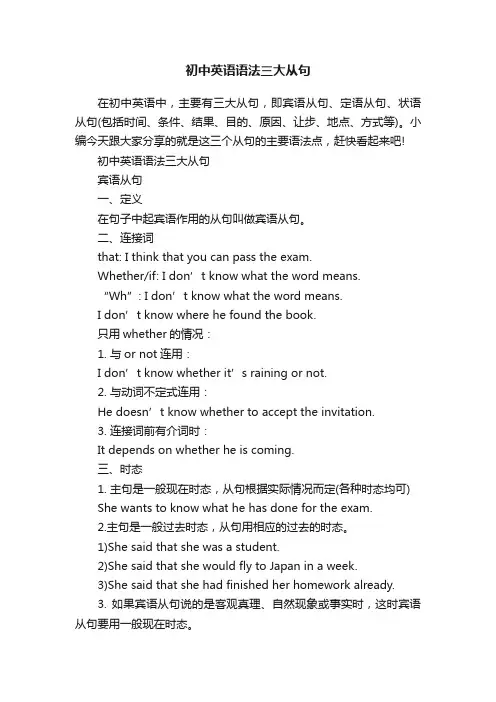
初中英语语法三大从句在初中英语中,主要有三大从句,即宾语从句、定语从句、状语从句(包括时间、条件、结果、目的、原因、让步、地点、方式等)。
小编今天跟大家分享的就是这三个从句的主要语法点,赶快看起来吧!初中英语语法三大从句宾语从句一、定义在句子中起宾语作用的从句叫做宾语从句。
二、连接词that: I think that you can pass the exam.Whether/if: I don’t know what the word means.“Wh”: I don’t know what the word means.I don’t know where he found the book.只用whether的情况:1. 与or not连用:I don’t know whether it’s raining or not.2. 与动词不定式连用:He doesn’t know whether to accept the invit ation.3. 连接词前有介词时:It depends on whether he is coming.三、时态1. 主句是一般现在时态,从句根据实际情况而定(各种时态均可)She wants to know what he has done for the exam.2.主句是一般过去时态,从句用相应的过去的时态。
1)She said that she was a student.2)She said that she would fly to Japan in a week.3)She said that she had finished her homework already.3. 如果宾语从句说的是客观真理、自然现象或事实时,这时宾语从句要用一般现在时态。
The teacher said that the earth goes round the sun.定语从句一、定义在复合句中修饰名词、代词的从句叫定语从句。
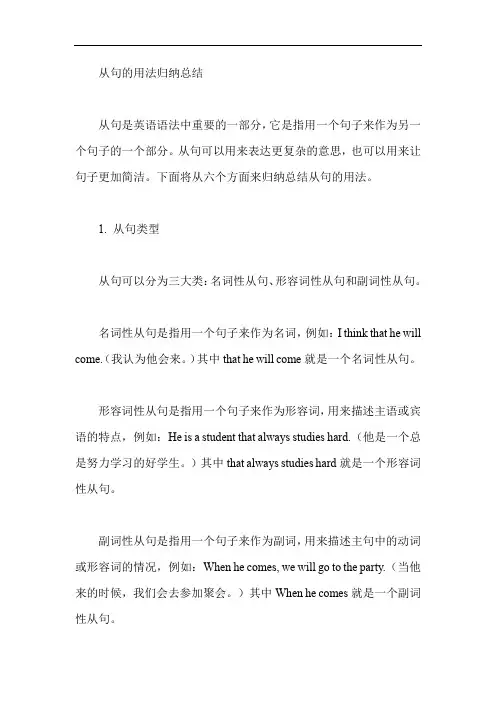
从句的用法归纳总结从句是英语语法中重要的一部分,它是指用一个句子来作为另一个句子的一个部分。
从句可以用来表达更复杂的意思,也可以用来让句子更加简洁。
下面将从六个方面来归纳总结从句的用法。
1. 从句类型从句可以分为三大类:名词性从句、形容词性从句和副词性从句。
名词性从句是指用一个句子来作为名词,例如:I think that he will come.(我认为他会来。
)其中that he will come就是一个名词性从句。
形容词性从句是指用一个句子来作为形容词,用来描述主语或宾语的特点,例如:He is a student that always studies hard.(他是一个总是努力学习的好学生。
)其中that always studies hard就是一个形容词性从句。
副词性从句是指用一个句子来作为副词,用来描述主句中的动词或形容词的情况,例如:When he comes, we will go to the party.(当他来的时候,我们会去参加聚会。
)其中When he comes就是一个副词性从句。
2. 从句引导词从句的引导词有很多种,不同的引导词可以引导不同类型的从句。
常用的引导词有:* that:可以引导名词性从句和形容词性从句,但是不能引导副词性从句;* what:可以引导名词性从句;* who:可以引导名词性从句和副词性从句;* whom:可以引导名词性从句;* which:可以引导名词性从句;* where:可以引导副词性从句;* when:可以引导副词性从句;* why:可以引导名词性从句;* how:可以引导名词性从句和副词性从句。
3. 从句语序在英语中,主句和从句的语序一般是不同的。
主句通常采用陈述语序,而从句则可以采用疑问语序或倒装语序。
例如:Do you know where he lives?(你知道他住在哪里吗?)其中where he lives就是一个名词性从句,采用了疑问语序。
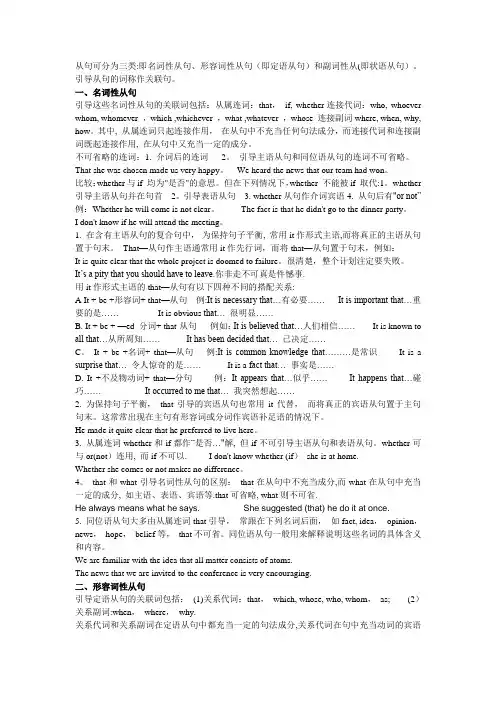
从句可分为三类:即名词性从句、形容词性从句(即定语从句)和副词性从(即状语从句)。
引导从句的词称作关联句。
一、名词性从句引导这些名词性从句的关联词包括:从属连词:that,if, whether连接代词:who, whoever whom, whomever ,which ,whichever ,what ,whatever ,whose 连接副词where, when, why, how。
其中, 从属连词只起连接作用,在从句中不充当任何句法成分,而连接代词和连接副词既起连接作用, 在从句中又充当一定的成分。
不可省略的连词:1. 介词后的连词2。
引导主语从句和同位语从句的连词不可省略。
That she was chosen made us very happy。
We heard the news that our team had won。
比较:whether与if 均为"是否"的意思。
但在下列情况下,whether 不能被if 取代:1。
whether 引导主语从句并在句首2。
引导表语从句 3. whether从句作介词宾语4. 从句后有"or not” 例:Whether he will come is not clear。
The fact is that he didn't go to the dinner party。
I don't know if he will attend the meeting。
1. 在含有主语从句的复合句中,为保持句子平衡, 常用it作形式主语,而将真正的主语从句置于句末。
That—从句作主语通常用it作先行词,而将that—从句置于句末,例如:It is quite clear that the whole project is doomed to failure。
很清楚,整个计划注定要失败。
It’s a pity that you should have to leave.你非走不可真是件憾事.用it作形式主语的that—从句有以下四种不同的搭配关系:A It + be +形容词+ that—从句例:It is necessary that…有必要……It is important that…重要的是……It is obvious that… 很明显……B. It + be + —ed 分词+ that-从句例如:It is believed that…人们相信……It is known to all that…从所周知……It has been decided that… 已决定……C。
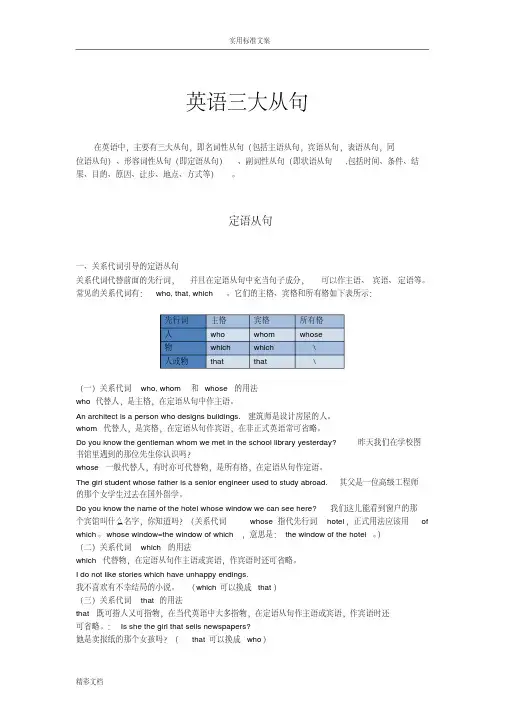
英语三大从句在英语中,主要有三大从句,即名词性从句(包括主语从句,宾语从句,表语从句,同位语从句)、形容词性从句(即定语从句)、副词性从句(即状语从句,包括时间、条件、结果、目的、原因、让步、地点、方式等)。
定语从句一、关系代词引导的定语从句关系代词代替前面的先行词,并且在定语从句中充当句子成分,可以作主语、宾语、定语等。
常见的关系代词有:who, that, which。
它们的主格、宾格和所有格如下表所示:先行词主格宾格所有格人who whom whose物which which \人或物that that \(一)关系代词who, whom和whose的用法who代替人,是主格,在定语从句中作主语。
An architect is a person who designs buildings. 建筑师是设计房屋的人。
whom代替人,是宾格,在定语从句作宾语,在非正式英语常可省略。
Do you know the gentleman whom we met in the school library yesterday? 昨天我们在学校图书馆里遇到的那位先生你认识吗?whose一般代替人,有时亦可代替物,是所有格,在定语从句作定语。
The girl student whose father is a senior engineer used to study abroad. 其父是一位高级工程师的那个女学生过去在国外留学。
Do you know the name of the hotel whose window we can see here? 我们这儿能看到窗户的那个宾馆叫什么名字,你知道吗?(关系代词whose指代先行词hotel,正式用法应该用of which。
whose window=the window of which,意思是:the window of the hotel。
)(二)关系代词which的用法which代替物,在定语从句作主语或宾语,作宾语时还可省略。
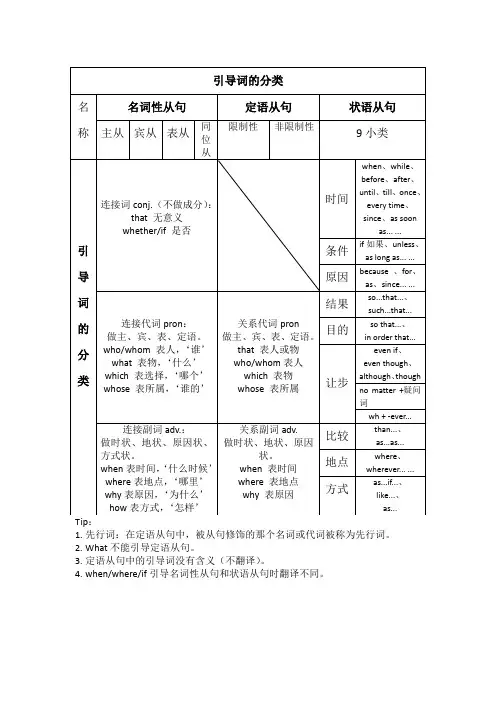
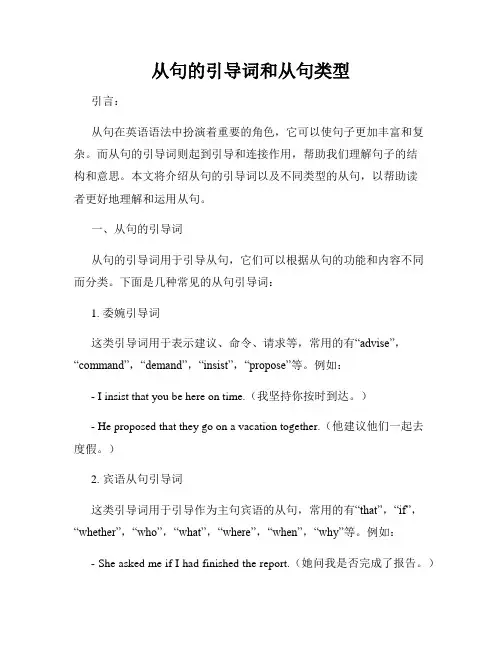
从句的引导词和从句类型引言:从句在英语语法中扮演着重要的角色,它可以使句子更加丰富和复杂。
而从句的引导词则起到引导和连接作用,帮助我们理解句子的结构和意思。
本文将介绍从句的引导词以及不同类型的从句,以帮助读者更好地理解和运用从句。
一、从句的引导词从句的引导词用于引导从句,它们可以根据从句的功能和内容不同而分类。
下面是几种常见的从句引导词:1. 委婉引导词这类引导词用于表示建议、命令、请求等,常用的有“advise”,“command”,“demand”,“insist”,“propose”等。
例如:- I insist that you be here on time.(我坚持你按时到达。
)- He proposed that they go on a vacation together.(他建议他们一起去度假。
)2. 宾语从句引导词这类引导词用于引导作为主句宾语的从句,常用的有“that”,“if”,“whether”,“who”,“what”,“where”,“when”,“why”等。
例如:- She asked me if I had finished the report.(她问我是否完成了报告。
)- I don't know where she lives.(我不知道她住在哪里。
)3. 主语从句引导词这类引导词用于引导作为主句主语的从句,常用的有“that”,“if”,“whether”,“who”,“what”,“where”等。
例如:- What you said is true.(你说的是真的。
)- Whether he will come to the party is still unknown.(他是否会来参加派对仍未知。
)4. 定语从句引导词这类引导词用于引导作为主句定语的从句,常用的有“that”,“who”,“which”,“whose”,“whom”等。
例如:- The book that you recommended is very interesting.(你推荐的那本书非常有趣。
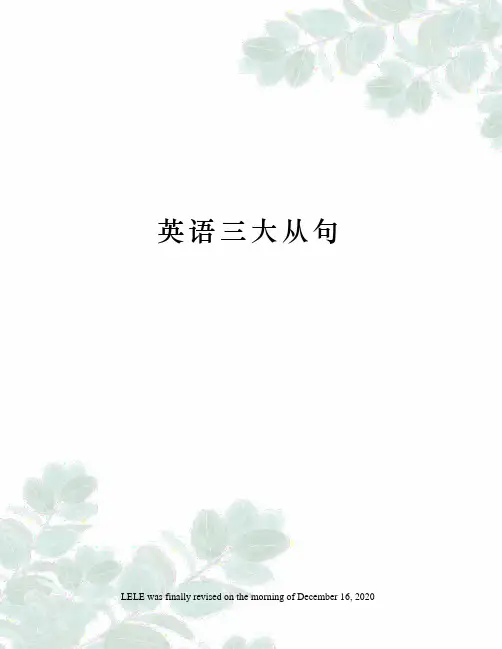
英语三大从句LELE was finally revised on the morning of December 16, 2020复合句【语法要点】复合句是由一个主句加一个或几个从句所构成的句子。
从句只用作句子的一个成分,不能独立。
根据从句在句子中的作用,可分为名词性从句、定语从句和状语从句三类。
(一)名词性从句名词性从句包括主语从句、表语从句、宾语从句、同位语从句。
其关联词有连接词that、if、whether;疑问代词who、what、which和疑问副词when、where、how、why等。
1)if不能引导表语从句。
连接代词who、what、whose、which不能引导同位语从句。
2)有时as、as if/though、because也可以引导表语从句,能跟表语从句的谓语动词一般为系动词be、seem、look等。
例如:Things are not always as they seem to be.事情并不总是像表面上看来的那样。
It looks as if it were going to rain. It is because you eat too much.3)介词宾语不可以用which来引导,而要用what来引导。
例如:We can learn what we did not know. He will talk to us about what he saw in the .4)连词that引导的名词性从句除能用在except、but、in后之外很少作介词的宾语,。
其它一些介词的宾语从句如果由连词that引导,则需用it先行一步作形式宾语。
例如:He is a good student except that he is careless.You may depend on it that they will support you.5)若主句谓语动词是及物动词make、find、think、see、hear等,则把宾语从句置于宾语补足语之后,用it作形式宾语。

初中英语语法三大从句在初中英语中,主要有三大从句,即宾语从句、定语从句、状语从句(包括时间、条件、结果、目的、原因、让步、地点、方式等)。
小编今天跟大家分享的就是这三个从句的主要语法点,赶快看起来吧!初中英语语法三大从句宾语从句一、定义在句子中起宾语作用的从句叫做宾语从句。
二、连接词that: I think that you can pass the exam.Whether/if: I don’t know what the word means.“Wh”: I don’t know what the word means.I don’t know where he found the book.只用whether的情况:1. 与or not连用:I don’t know whether it’s raining or not.2. 与动词不定式连用:He doesn’t know whether to accept the invit ation.3. 连接词前有介词时:It depends on whether he is coming.三、时态1. 主句是一般现在时态,从句根据实际情况而定(各种时态均可)She wants to know what he has done for the exam.2.主句是一般过去时态,从句用相应的过去的时态。
1)She said that she was a student.2)She said that she would fly to Japan in a week.3)She said that she had finished her homework already.3. 如果宾语从句说的是客观真理、自然现象或事实时,这时宾语从句要用一般现在时态。
The teacher said that the earth goes round the sun.定语从句一、定义在复合句中修饰名词、代词的从句叫定语从句。
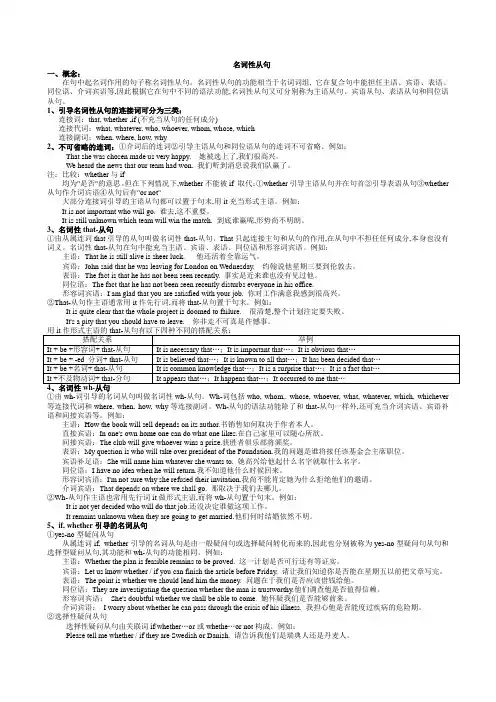
名词性从句一、概念:在句中起名词作用的句子称名词性从句。
名词性从句的功能相当于名词词组, 它在复合句中能担任主语、宾语、表语、同位语、介词宾语等,因此根据它在句中不同的语法功能,名词性从句又可分别称为主语从句、宾语从句、表语从句和同位语从句。
1、引导名词性从句的连接词可分为三类:连接词:that, whether ,if (不充当从句的任何成分)连接代词:what, whatever, who, whoever, whom, whose, which连接副词:when, where, how, why2、不可省略的连词:①介词后的连词②引导主语从句和同位语从句的连词不可省略。
例如:That she was chosen made us very happy. 她被选上了,我们很高兴。
We heard the news that our team had won. 我们听到消息说我们队赢了。
注:比较:whether与if均为"是否"的意思。
但在下列情况下,whether不能被if 取代:①whether引导主语从句并在句首②引导表语从句③whether 从句作介词宾语④从句后有"or not"大部分连接词引导的主语从句都可以置于句末,用it充当形式主语。
例如:It is not important who will go. 谁去,这不重要。
It is still unknown which team will win the match. 到底谁赢呢,形势尚不明朗。
3、名词性that-从句①由从属连词that引导的从句叫做名词性that-从句。
That只起连接主句和从句的作用,在从句中不担任任何成分,本身也没有词义。
名词性that-从句在句中能充当主语、宾语、表语、同位语和形容词宾语。
例如:主语:That he is still alive is sheer luck.他还活着全靠运气。
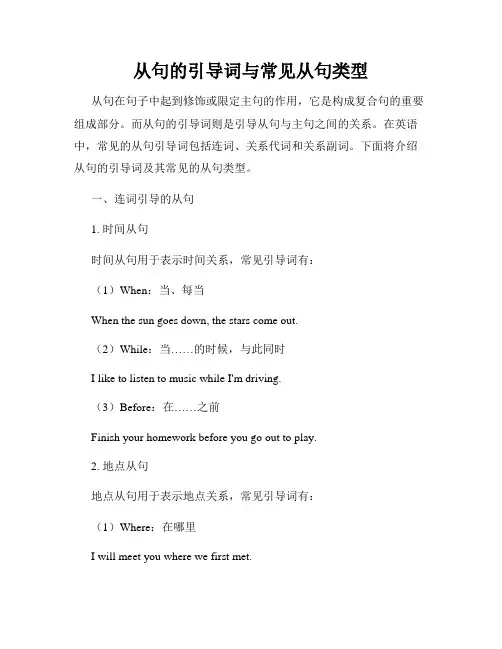
从句的引导词与常见从句类型从句在句子中起到修饰或限定主句的作用,它是构成复合句的重要组成部分。
而从句的引导词则是引导从句与主句之间的关系。
在英语中,常见的从句引导词包括连词、关系代词和关系副词。
下面将介绍从句的引导词及其常见的从句类型。
一、连词引导的从句1. 时间从句时间从句用于表示时间关系,常见引导词有:(1)When:当、每当When the sun goes down, the stars come out.(2)While:当……的时候,与此同时I like to listen to music while I'm driving.(3)Before:在……之前Finish your homework before you go out to play.2. 地点从句地点从句用于表示地点关系,常见引导词有:(1)Where:在哪里I will meet you where we first met.(2)Wherever:无论在哪里Wherever you go, I will be with you.(3)There:在那里There is a beautiful garden where we can relax.3. 原因从句原因从句用于表示原因或理由,常见引导词有:(1)Because:因为We stayed at home because it was raining.(2)Since:因为Please take an umbrella since it might rain later.(3)As:因为As it was getting late, they decided to leave.4. 条件从句条件从句用于表示条件关系,常见引导词有:(1)If:如果If you are free, let's go to the cinema together.(2)Unless:除非We won't win the game unless we play our best.(3)Provided that:只要You can borrow my car provided that you drive carefully.5. 结果从句结果从句用于表示结果或后果,常见引导词有:(1)So:所以I was tired, so I went to bed early.(2)Therefore:因此He didn't study hard, therefore he failed the exam.(3)Thus:因此She loves eating fruits, thus she always has a good complexion.二、关系词引导的从句关系词引导的从句用于修饰某个名词或代词,常见关系代词有:1. Who/Whom:谁,宾格用法The girl who is talking to Peter is my sister.2. Whose:谁的The woman whose car was stolen reported the crime to the police. 3. Which:哪个The book which I borrowed from the library is very interesting.4. That:关系代词,指物或人The movie that we watched yesterday was amazing.关系副词引导的从句用于修饰某个名词或代词,常见关系副词有:1. When:在……时That was the day when we first met.2. Where:在哪里I still remember the place where we had our first date.3. Why:为什么Do you know the reason why he didn't come to the party?总结:本文介绍了常见的从句引导词及其常见的从句类型,并给出了相应的例句。
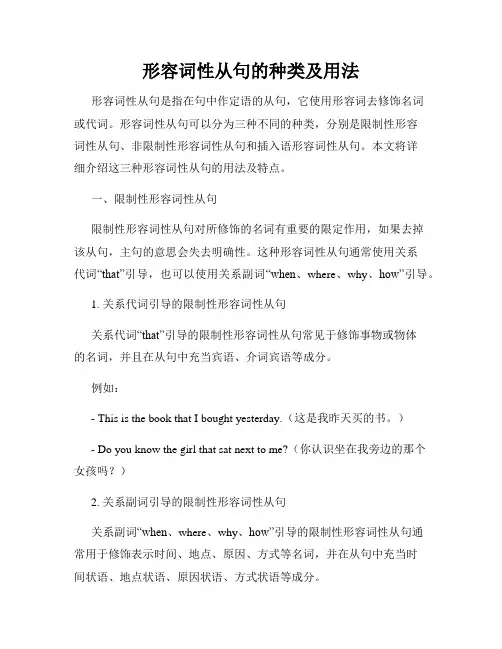
形容词性从句的种类及用法形容词性从句是指在句中作定语的从句,它使用形容词去修饰名词或代词。
形容词性从句可以分为三种不同的种类,分别是限制性形容词性从句、非限制性形容词性从句和插入语形容词性从句。
本文将详细介绍这三种形容词性从句的用法及特点。
一、限制性形容词性从句限制性形容词性从句对所修饰的名词有重要的限定作用,如果去掉该从句,主句的意思会失去明确性。
这种形容词性从句通常使用关系代词“that”引导,也可以使用关系副词“when、where、why、how”引导。
1. 关系代词引导的限制性形容词性从句关系代词“that”引导的限制性形容词性从句常见于修饰事物或物体的名词,并且在从句中充当宾语、介词宾语等成分。
例如:- This is the book that I bought yesterday.(这是我昨天买的书。
)- Do you know the girl that sat next to me?(你认识坐在我旁边的那个女孩吗?)2. 关系副词引导的限制性形容词性从句关系副词“when、where、why、how”引导的限制性形容词性从句通常用于修饰表示时间、地点、原因、方式等名词,并在从句中充当时间状语、地点状语、原因状语、方式状语等成分。
例如:- I still remember the day when we first met.(我仍然记得我们初次见面的那一天。
)- He showed me the place where he used to live.(他带我去了他曾经居住过的地方。
)二、非限制性形容词性从句非限制性形容词性从句是对名词进行进一步的补充说明,并不对名词有特定的限定作用。
这种形容词性从句通常使用关系代词“which”引导,也可以使用关系副词“when、where、why、how”引导。
1. 关系代词引导的非限制性形容词性从句关系代词“which”引导的非限制性形容词性从句常见于对事物或物体进行陈述、说明或补充的情况,并且在从句中充当主语、宾语等成分。
从句的类型及引导词总结从句是一种在句子中起到特定功能的句子成分。
它可以作为主句的主语、宾语、定语或状语,起到丰富句子意义和提供更多信息的作用。
从句根据功能和结构可以分为名词性从句、形容词性从句和副词性从句,而引导从句的词语则根据从句的类型来确定。
下面将对这些从句类型及其引导词进行总结。
一、名词性从句名词性从句在句子中扮演名词的角色,可以作为主语、宾语、表语或同位语。
常见的名词性从句有主语从句、宾语从句、表语从句和同位语从句。
1. 主语从句:从句作为整个句子的主语,通常以从属连词"that"引导。
例如:- What he said is true.(他说的是真的。
)- That he is late is unacceptable.(他迟到是不可接受的。
)2. 宾语从句:从句作为句子中的宾语,可以由多个引导词引导,如"that"、"if"、"whether"、"who"、"what"等。
例如:- I don't know if he will come.(我不知道他是否会来。
)- She asked me what my favorite color is.(她问我最喜欢的颜色是什么。
)3. 表语从句:从句作为句子中的表语,通常以从属连词"that"引导。
例如:- The fact is that he lied to us.(事实是他对我们撒了谎。
)- My dream is that I can travel around the world.(我的梦想是能环游世界。
)4. 同位语从句:从句作为另一个名词或代词的同位语,通常以从属连词"that"或连接代词/连接副词引导。
例如:- The news that she won the first prize was exciting.(她赢得一等奖的消息令人激动。
状语从句状语从句用来修饰主句中的动词,副词和形容词的从句叫状语从句。
根据其含义状语从句可分为时间状语从句,地点状语从句,条件状语从句,原因状语从句,结果状语从句,比较状语从句,目的状语从句,让步状语从句。
1. 时间状语从句(1)时间状语从句常用when, as, while, before, after, since, till, until, as soon as等连词来引导。
例如:It was raining hard(rain hard下大雨)when got to school yesterday.While he was doing his homework, the telephone rang.As he walked along(沿着走)the lake, he sang happily.He had learned a little Chinese before he came to China.After he finished middle school, he went to work in a factory.(2)在时间状语从句里,通常不用将来时态,用现在时态表示将来的动作或状态。
例如:I’ll ring you up as soon as I get to New York.I will tell him everything when he comes back.He won’t believe it until he sees it with his own eyes.(3)在带有till或until引导的时间状语从句的主从复合句里,如果主句用肯定式,其含义是“一直到……时”,谓语动词只能用延续性动词。
如果主句用否定式,其含义是“直到……才……”, “在……以前不……”, 谓语动词可用瞬间动词。
例如:The young man read till the light went out(熄灭).Let’s wait until the rain stops.We won’t start until Bob comes.Don’t get off(从下来)until the bus stops.【Till是指直到某一特定事件发生的时候,而在那个时刻之后,该事情或状况仍将持续。
引导名词性从句的连接词可分为三类:连词:that(无任何词意)whether,if(均表示“是否”表明从句内容的不确定性)as if ,as though(均表示“好像”,“似乎”)以上在从句中均不充当任何成分连接代词:what, whatever, who, whoever, whom,whose, whichever,whomever连接副词:when, where, how, why,how many,how much,how often 不可省略的连词:1. 介词后的连词2. 引导主语从句和同位语从句的连词不可省略。
主语从句(在复合句中,作句子的从句叫主语从句。
引导主语从句的词有从属连词that,whether以及连接代词who,what,which,w hoever,whatever,whichever呵连接副词when,where,why,how 等。
)it作形式主语的从句1.It is +adj. / n.+从句例如:It is a pity/shame that…遗憾的是…2.It +vi.+从句例如:It seems that…似乎…It happened that…碰巧…3.It+be+过去分词+从句例如:It said that…据说…注意:“it is necessary / natural / important / stange…+th at从句”这种句型里,that所引导的主语从句中谓语动词用“shou ld+原形”,表虚拟语气。
引导词that与whatThat引导主语从句是,只起连接作用,本身无实际意义,在从句中不担当任何句子成分,但不能省略;what既有引导主语从句的作用,同时又在从句中作句子成分(主语、宾语、表语、等),这时w hat相当于all that/everying that…例如:What we can’t get seems better than what we have.我们得不到的东西似乎比已得到的要好。
简述各种从句中的引导词一.名词性从句是指在句中充当名词能充当的成分(如主语,宾语,表语,同位语)的从句,包括主语从句,宾语从句,表语从句和同位语从句。
引导名词性从句的连接词可分为三类:连词(5个):that (宾语从句或表语从句中"that"有时可以省略)whether, if (均表示“是否”表明从句内容的不确定性)as if ,as though (均表示“好像”,“似乎”)以上在从句中均不充当任何成分连接代词(9个):what, whatever, who, whoever, whom, whomever, whose, which, whichever连接副词(7个):when, where, how, why, whenever, wherever, however A.宾语从句中的引导词1.从属连词,包括that、 if、whether、as if和as though,都不在从句中从当任何成分。
that引导表示陈述句的宾语从句,通常可省略。
if和whether,whether...or not引导表示“是否”的一般疑问句的宾语从句。
如:He told me (that )he would go to college the next year.Nobody knew whether he could pass the exam.2.关联代词who,whom,whose,what,whoever,whomever,whosever,whatever,whichever等。
如:Do you know who has won Red Alert game?The book will show you what the best CEO should know.Have you determined whichever you should buy,a Motorola or Nokia call phone?3.连接副词主要有when,where,why,how,whenever,wherever,however等. 如:He didn’t tell me when we sh ould meet again.Could you please tell me how you use the new panelNone of us knows where these new parts can be bought.B.主语从句中的引导词1)从属连词that,whether,if等;其中that一般见于形式主语后面的从句中,通常可省略。
初中英语语法讲解:名词性从句、形容词性从句、副词性从句一、名词性从句1. 概念名词性从句是指在句子中起名词作用的从句,包括主语从句、宾语从句、表语从句和同位语从句。
2. 搭配与用法主语从句:作为句子的主语,通常使用连接词that(无实际意义,不可省略)或whether/if(表示选择,不可省略)引导。
例句:That he will come to the party remains uncertain.(他是否会来参加聚会还不确定。
)宾语从句:作为动词或介词的宾语,可以由that、if/whether、特殊疑问词等引导。
例句:I don't know if he will come.(我不知道他是否会来。
)表语从句:作为连系动词的表语,通常由that引导,但that通常可以省略。
例句:The fact is that he didn't come.(事实是,他没来。
)同位语从句:用于解释说明前面的名词,通常由that引导,但that不可省略。
例句:The news that he resigned was a surprise.(他辞职的消息是个惊喜。
)3. 注意事项宾语从句中,当主句的谓语动词是think、believe、expect、suppose等表示心理活动的动词时,如果宾语从句表示的是事实,则宾语从句的否定通常要转移到主句上来表达。
例句:I don't think he will come.(我认为他不会来。
)在名词性从句中,一般不使用疑问句语序,而是使用陈述句语序。
例句:Can you tell me how I can get to the park?(请告诉我如何去公园?)而不是Can you tell me how can I get to the park?二、形容词性从句(定语从句)1. 概念形容词性从句,也称为定语从句,用于修饰或限定一个名词或代词,描述这个名词或代词的性质或特征。
引导主语从句连词有that,whether,who,what,whatever等定义:如果一个句子在复合句中充当一个主语,那么这个句子就是主语从句.第一部分:常规主语从句,即句子在复合句中充当一个主语(1)That he finished writing the composition in such a short time surprised me.(2)Whether we will go for an outing tomorrow remains unknown. (3)Who will be our monitor has't been decided yet.(4)Whom we must study for is a question of great importance. (5)What caused the accident remains unknown.(6)Whatever you did is right.(7)Whose watch was lost is unknown.(8)What we need is time.(9)What we need are good doctors.小结:(1)引导主语从句连词有that,whether,who,what,whatever等(2)连词位于句首不能省略(3)主语从句大多数情况下视为单三,但也有例外,如例9第二部分:为了防止句子头重脚轻,通常把形式主语it放在主语位置,真正主语搁置于句末(1)It is certain that he will win the match.(2)It is true that he has made a very important discovery in chemistry. (3)It is very likely that they will hold a meeting.(4)It is strange that he should do that.(5)It is important that we all should attend the meeting.(6)It is strange that the man should have stuck to his silly ideas. (7)It is a pity that we won't be able to go to the south to spend our vacation.(8)It is still a mystery what caused the accident.(9)It is said that he has gone to Taiwan.(=He is said to have gone to Taiwan)(10)It is known to all that the gun powder was first invented by the Chinese.(11)It is suggested that the work should be done with great care. (12)It seems that he has seen the film.(=He seems to have seen the film)(13)It happened that the two cheats were there. (=The two cheats happened to be there)小结:(1)以that 引出的主语从句,常以形式主语it引导. It is +形容词/名词/某些动词ed + that 从句.(2) 在有些that从句中要用虚拟语气(should+do/should+have done)例句4,5,6,11.名词性从句在句子中起名词作用的句子叫名词从句(Noun Clauses)。
名词从句的功能相当于名词词组, 它在复合句中能担任主语、宾语、表语、同位语、介词宾语等,因此根据它在句中不同的语法功能,名词从句又可分别称为主语从句、宾语从句、表语从句和同位语从句。
一、引导名词性从句的连接词引导名词性从句的连接词可分为三类:连词:that(无任何词意)whether, if均表示“是否”表明从句内容的不确定性)as if ,as though(均表示“好像”,“似乎”)以上在从句中均不充当任何成分连接代词:what, whatever, who, whoever, whom,whose, which. whichever, whomever连接副词:when, where, how, why不可省略的连词:1. 介词后的连词2. 引导主语从句和同位语从句的连词不可省略。
That she was chosen made us very happy.We heard the news that our team had won.比较:whether与if 均为"是否"的意思。
但在下列情况下,whether 不能被if 取代:1. whether引导主语从句并在句首2. 引导表语从句3. whether从句作介词宾语4. 从句后有"or not"Whether he will come is not clear.大部分连接词引导的主语从句都可以置于句末,用it充当形式主语。
It is not important who will go.It is still unknown which team will win the match.二.主语从句1. 作句子主语的从句叫主语从句。
主语从句通常由从属连词that,whether,if和连接代词what,who,which,whatever,whoever以及连接副词how,when,where,why等词引导。
that在句中无词义,只起连接作用;连接代词和连接副词在句中既保留自己的疑问含义、又起连接作用,在从句中充当从句的成分。
例如:What he wants to tell us is not clear. 他要跟我们说什么,还不清楚。
Who will win the match is still unknown. 谁能赢得这场比赛还不得而知。
It is known to us how he became a writer. 我们都知道他是如何成为一名作家的。
Where the English evening will be held has not yet been announced. 英语晚会将在哪里举行,还没有宣布。
2. 有时为避免句子头重脚轻,常用形式主语it代替主语从句作形式主语放于句首,而把主语从句置于句末。
主语从句后的谓语动词一般用单数形式。
常用句型如下:(1)It + be + 名词+ that从句(2)It + be + 形容词+ that从句(3)It + be + 动词的过去分词+ that从句It is believed that 25 years after construction, the building was dismantled and moved timber by timber to the South Bank of the Thames, where a reconstruction of the theatre now stands.据信经过25年的建设后,该建筑物将被拆处.并且该建筑物的一砖一石将被移到泰唔士河的南岸.重建的戏剧院现在正座落于此。
It is thought the cost of this lost labour is around £1 billion (10 billion yuan) to businesses and the economy.大家一直认为这次对贸易和经济失去劳动力的损失的费用应该在10亿英镑(人民币100亿元)It is not known how many of the 59 million words Mr Shea has remembered but he has certainly made history with his eccentric hobby.在590万的词汇中Mr.Shea到底记住了多少不得为知,但是她却以这样的怪癖创造了历史。
(4)It + 不及物动词+ that 从句3. 另注意在主语从句中用来表示惊奇、不相信、惋惜、理应如此等语气时,谓语动词要用虚拟语气“(should) +do”,常用的句型有:It is necessary (important, natural, strange, etc.) that …It is a pity (a shame, no wonder, etc.) that…It is suggested (requested, proposed, desired, etc.) that…4. It 作形式主语和it引导强调句的比较It 作形式主语代替主语从句,主要是为了平衡句子结构,主语从句的连接词没有变化。
而it引导的强调句则是对句子某一部分进行强调,无论强调的是什么成分,都可用连词that。
被强调部分指人是也可用who/whom。
例如:It is a pity that you didn’t go to see the film. It doesn’t interest me whether you succeed or not.It is in the morning that the murder took place. It is John that broke the window.5. What 与that 在引导主语从句时的区别What 引导主语从句时在句时在从句中充当句子成分,如主语.宾语.表语,而that 则不然。
(1) What you said yesterday is right. (2) That she is still alive is a consolation.名词性从句---宾语从句 ;表语从句(2009-03-18 22:15:32)转载三、宾语从句名词句用作宾语的从句叫宾语从句。
引导宾语从句的关联词与引导主语从句表语从句的关联词大致一样,在句中可以作谓语动词或介词及非谓语动词的宾语。
1. 作动词的宾语:1). 由that引导的宾语从句(that 通常可以省略, 例如:He has told me that he will go to Shanghai tomorrow. 他已经告诉我他明天要去上海。